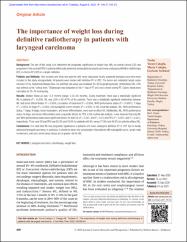| dc.contributor.author | Yürüt-Çaloğlu, Vuslat | |
| dc.contributor.author | Çaloğlu, Murat | |
| dc.contributor.author | Türkkan, Görkem | |
| dc.date.accessioned | 2022-08-09T12:58:20Z | |
| dc.date.available | 2022-08-09T12:58:20Z | |
| dc.date.issued | 2022 | en_US |
| dc.identifier.citation | Yurut‑Caloglu V, Caloglu M, Turkkan G. The importance of weight loss during definitive radiotherapy in
patients with laryngeal carcinoma. J Can Res Ther 2022;18:638‑43. | en_US |
| dc.identifier.issn | 19984138 | |
| dc.identifier.uri | https://hdl.handle.net/20.500.12809/10197 | |
| dc.description.abstract | Background: The aim of this study is to determine the prognostic significance of weight loss (WL) on overall survival (OS) and progression-free survival (PFS) in patients with locally advanced unresectable laryngeal carcinoma undergoing definitive radiotherapy (RT) or chemo-RT (CRT) in a single institution. Patients and Methods: One hundred and thirty-two patients with newly diagnosed locally advanced laryngeal carcinoma were included in this study retrospectively. All patients were treated with definitive RT or CRT. The tumor and metastatic lymph nodes received 70 Gy. Subclinical disease (low-risk and high-risk area) was irradiated 50-60 Gy prophylactically. Unintentional WL ≥5% was defined as the "critical level." Bodyweight was evaluated on the 1st day of RT and once a week during RT. Caloric needs were calculated as 25-30 kcal/kg/day. Results: Median follow-up was 17.8 months (range: 2.35-85 months). During treatment, there was a statistically significant WL in patients (P = 0.004). WL was ≥5% in 62 (47%) of the patients. There was a statistically significant relationship between WL and tumor differentiation (P = 0.004), completion of treatment (P = 0.004), WHO performance status (P < 0.0001), T stage (P = 0.003), N stage (P = 0.049), and supraglottic tumor location (P = 0.005). In the univariate analysis, WL, WHO performance status, T stage, N stage, tumor localization, and tumor differentiation, were seen to affect OS. Additionally, WL, WHO performance status, N stage, and tumor differentiation were prognostic factors for PFS. In the multivariate analysis, it was observed that only WL and WHO performance status were significant factors for both OS (P = 0.001, and P < 0.01) and PFS (P < 0.001, and P < 0.001), respectively. Three-year OS and PFS was 50.3% and 19.5% for patients with WL versus 77.8% and 49.0% for patients without WL. Conclusions: It is clear that WL has prognostic significance in patients who have undergone definitive RT or CRT due to locally advanced laryngeal carcinoma. In particular, it should be taken into consideration that patients with supraglottic tumor, lymph node involvement, and poor performance status are at greater risk for WL. | en_US |
| dc.item-language.iso | eng | en_US |
| dc.publisher | NLM (Medline) | en_US |
| dc.relation.isversionof | 10.4103/jcrt.JCRT_727_20 | en_US |
| dc.item-rights | info:eu-repo/semantics/openAccess | en_US |
| dc.subject | Laryngeal carcinoma | en_US |
| dc.subject | Radiotherapy | en_US |
| dc.subject | Weight loss | en_US |
| dc.title | The importance of weight loss during definitive radiotherapy in patients with laryngeal carcinoma | en_US |
| dc.item-type | article | en_US |
| dc.contributor.department | MÜ, Tıp Fakültesi, Dahili Tıp Bilimleri Bölümü | en_US |
| dc.contributor.institutionauthor | Türkkan, Görkem | |
| dc.identifier.volume | 18 | en_US |
| dc.identifier.issue | 3 | en_US |
| dc.identifier.startpage | 638 | en_US |
| dc.identifier.endpage | 643 | en_US |
| dc.relation.journal | Journal of cancer research and therapeutics | en_US |
| dc.relation.publicationcategory | Makale - Uluslararası Hakemli Dergi - Kurum Öğretim Elemanı | en_US |


















